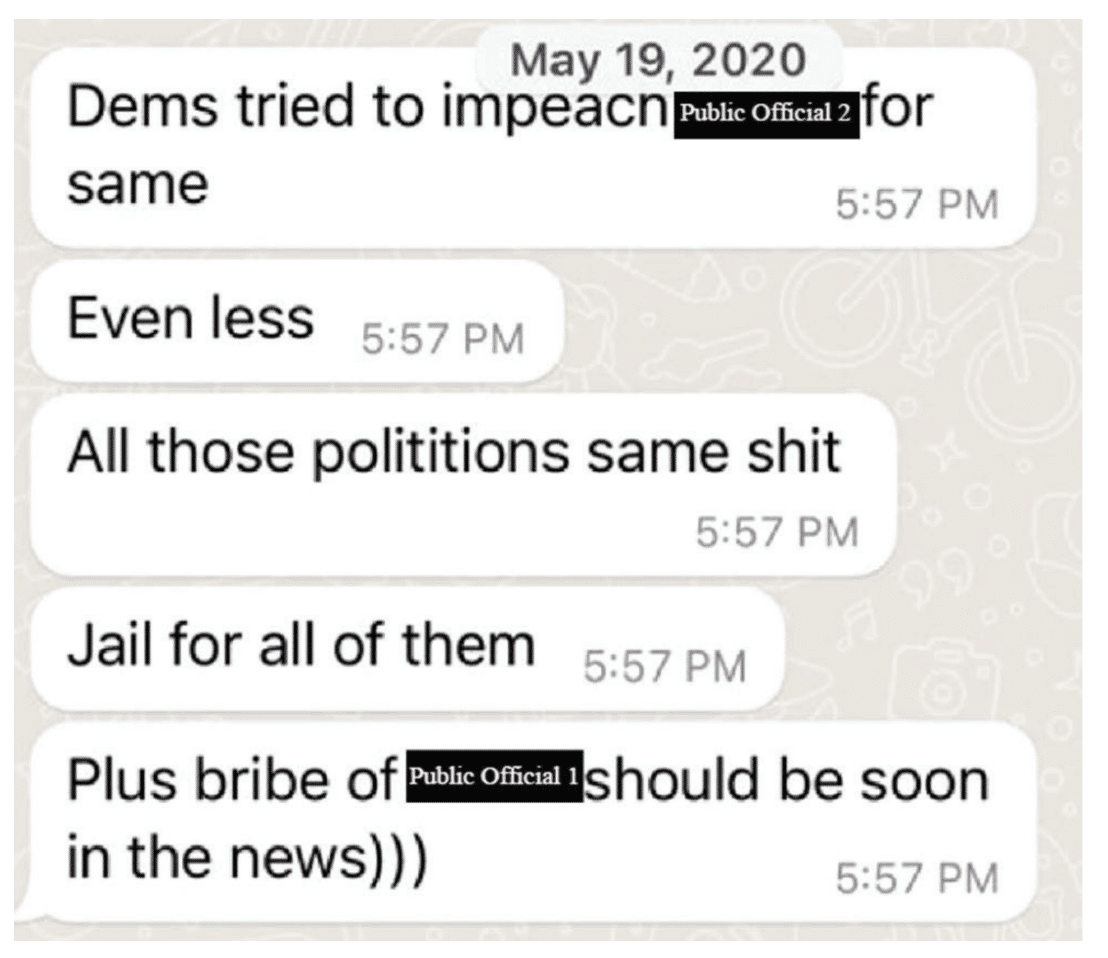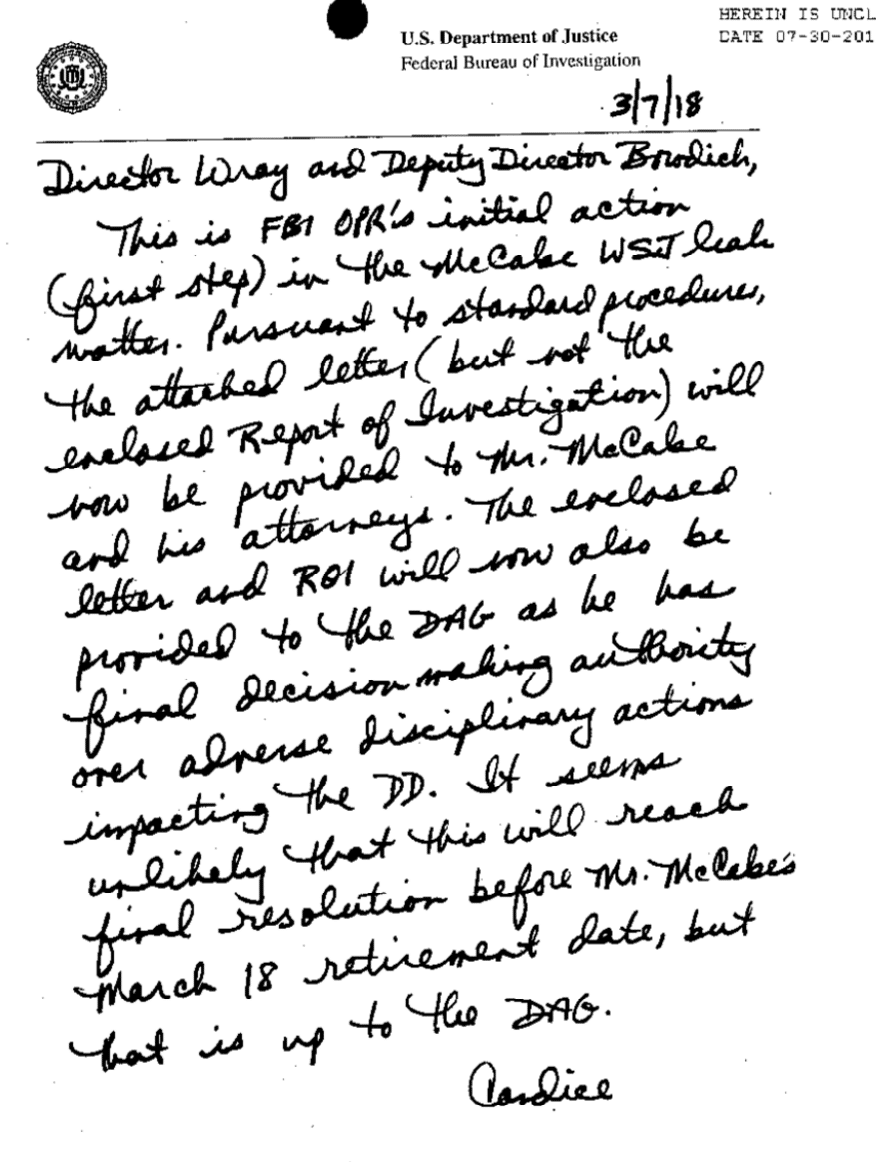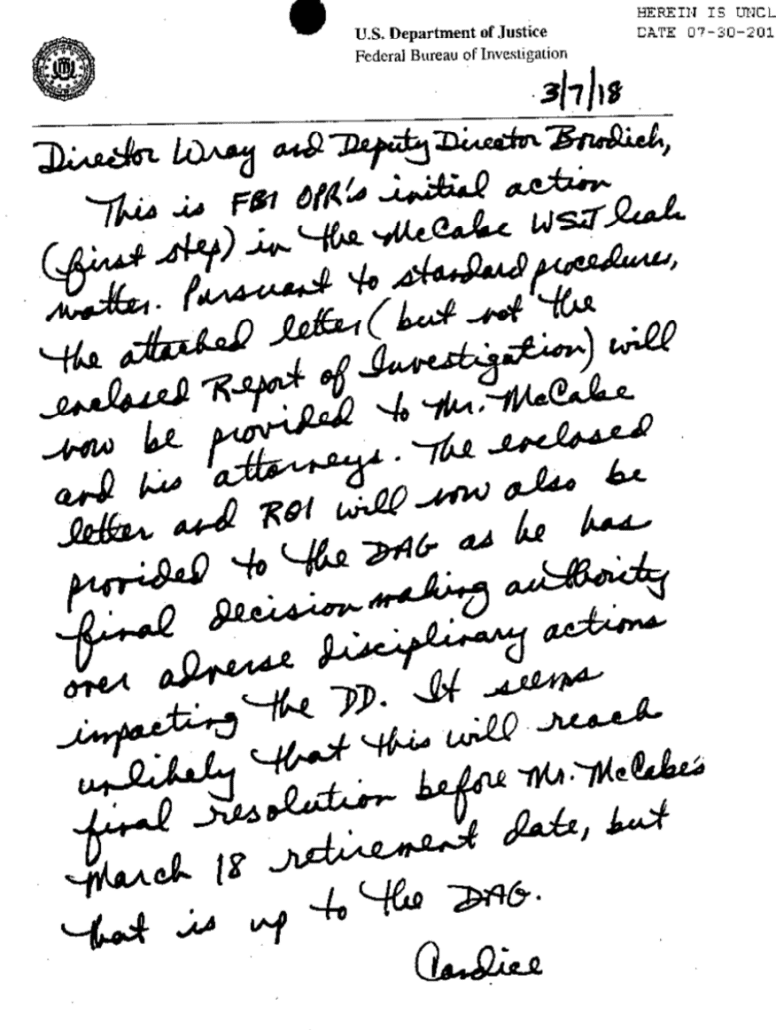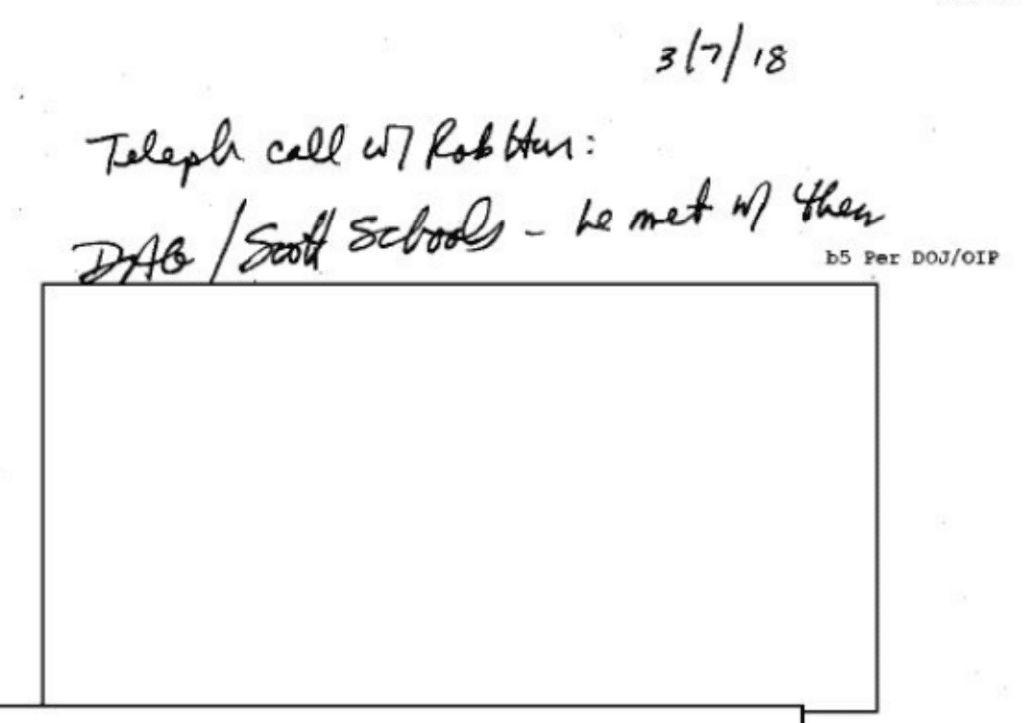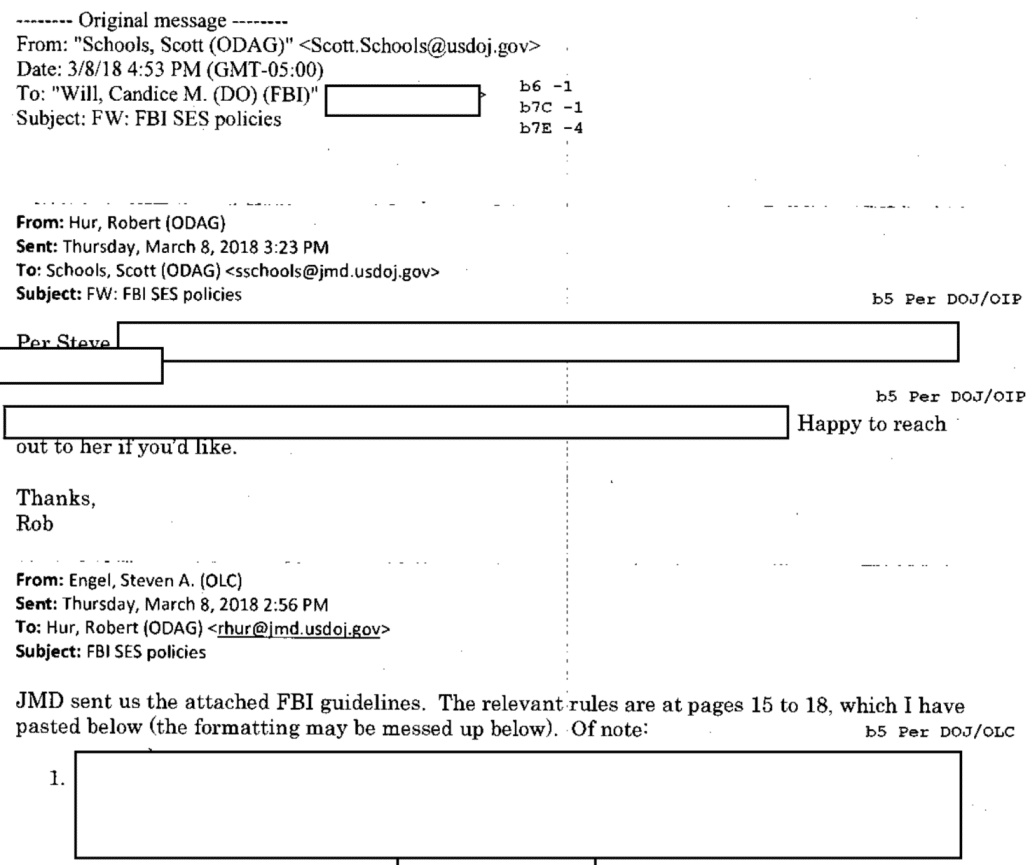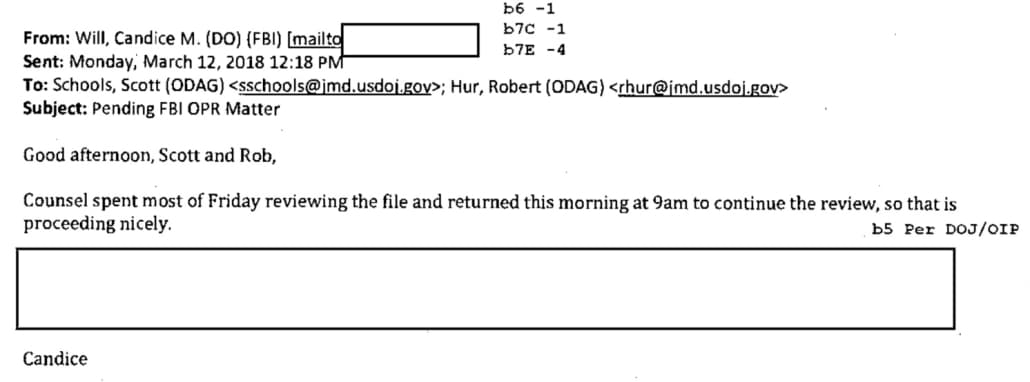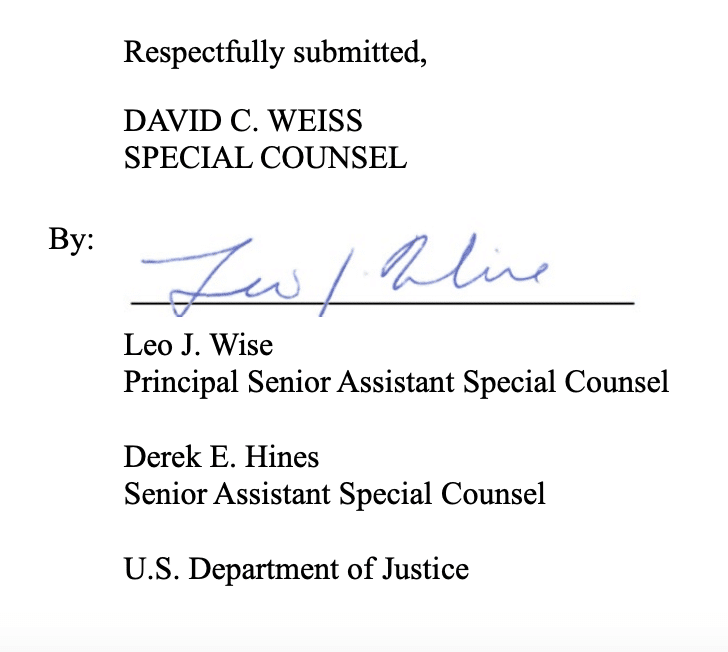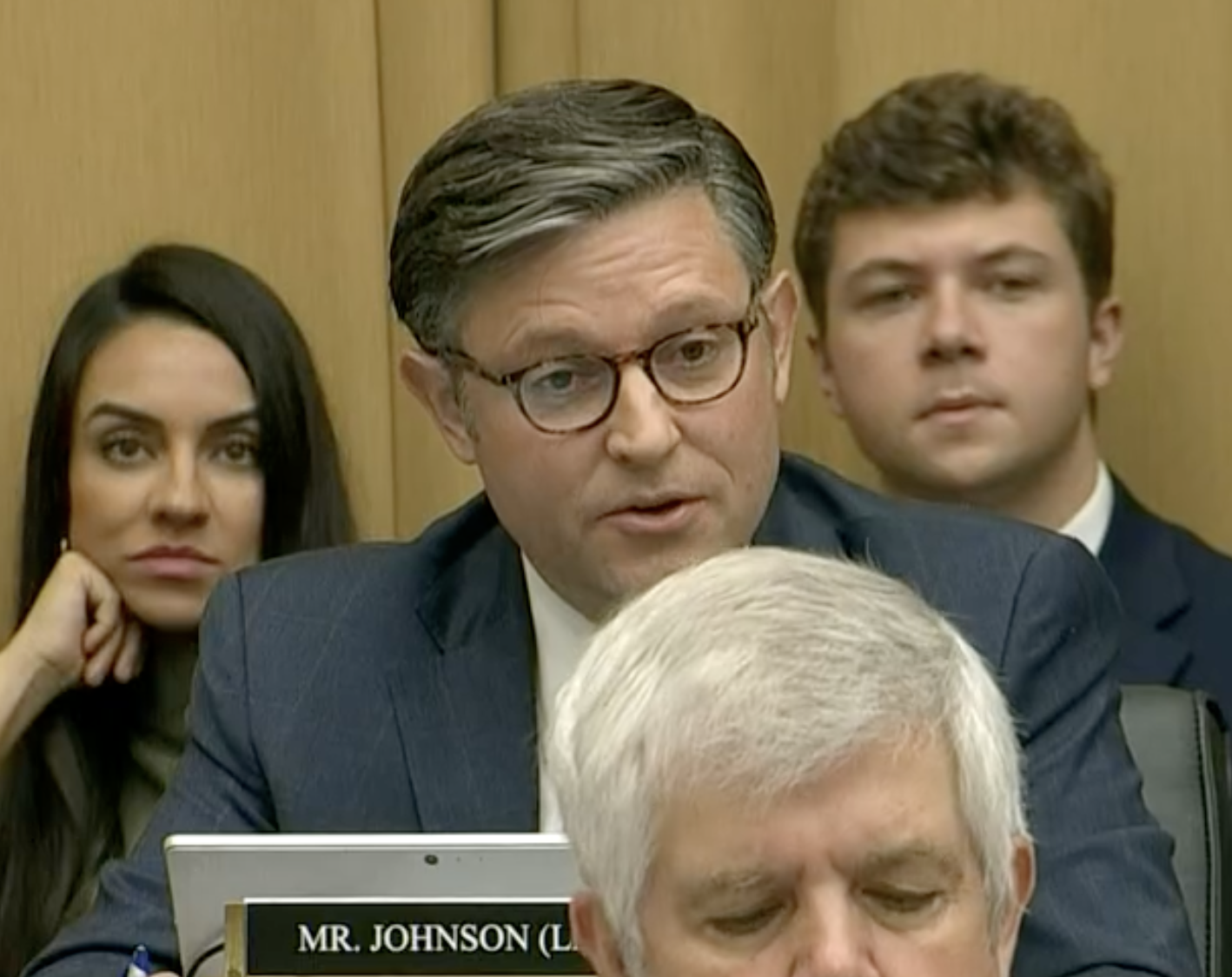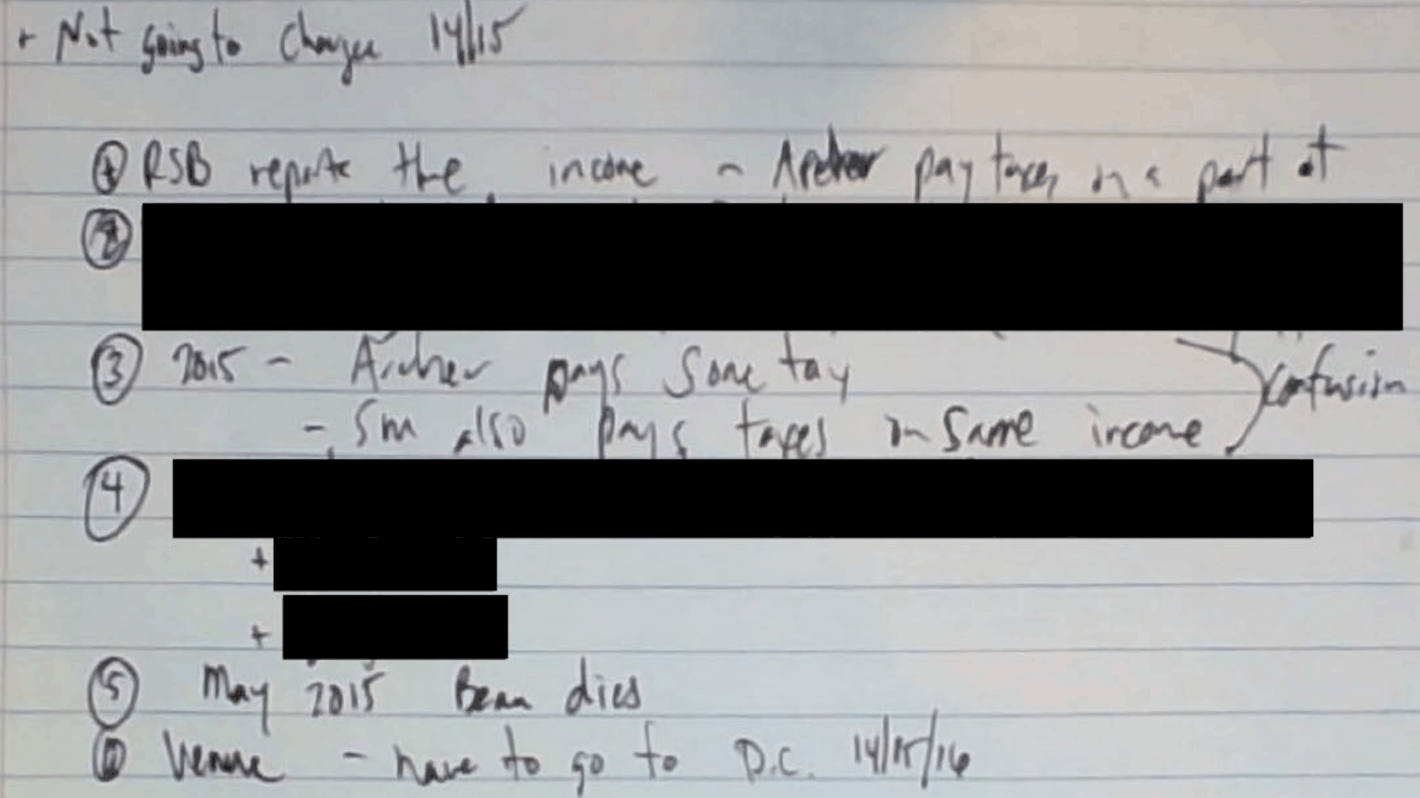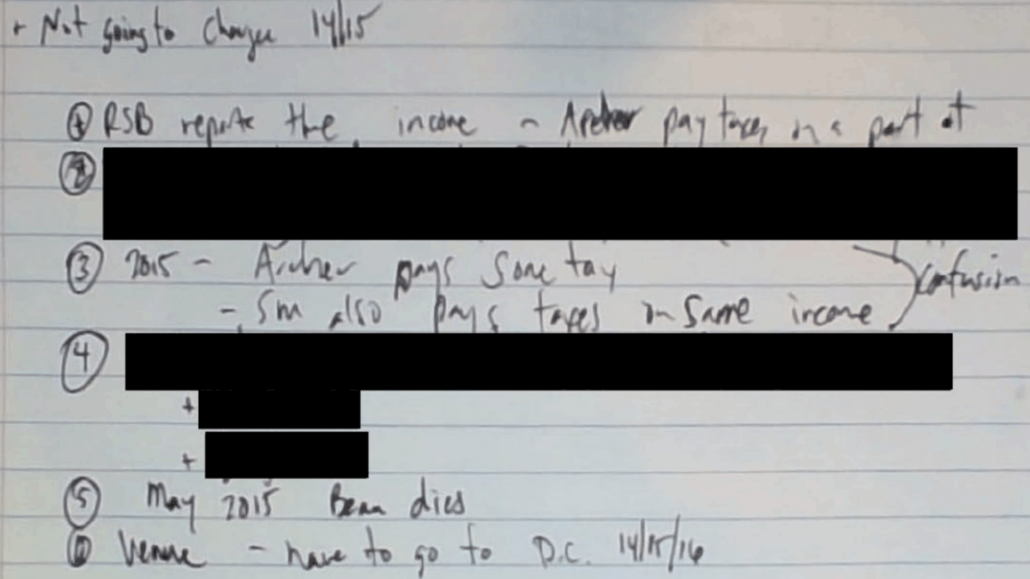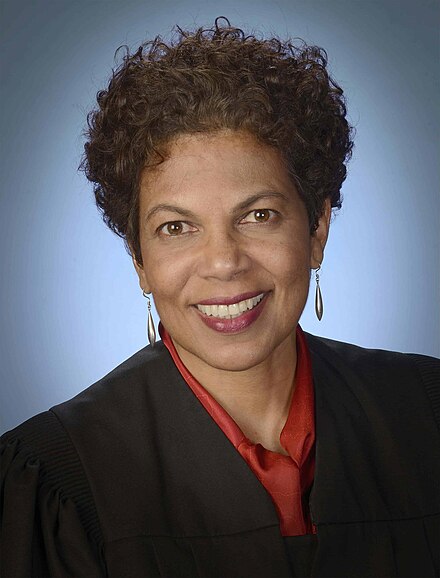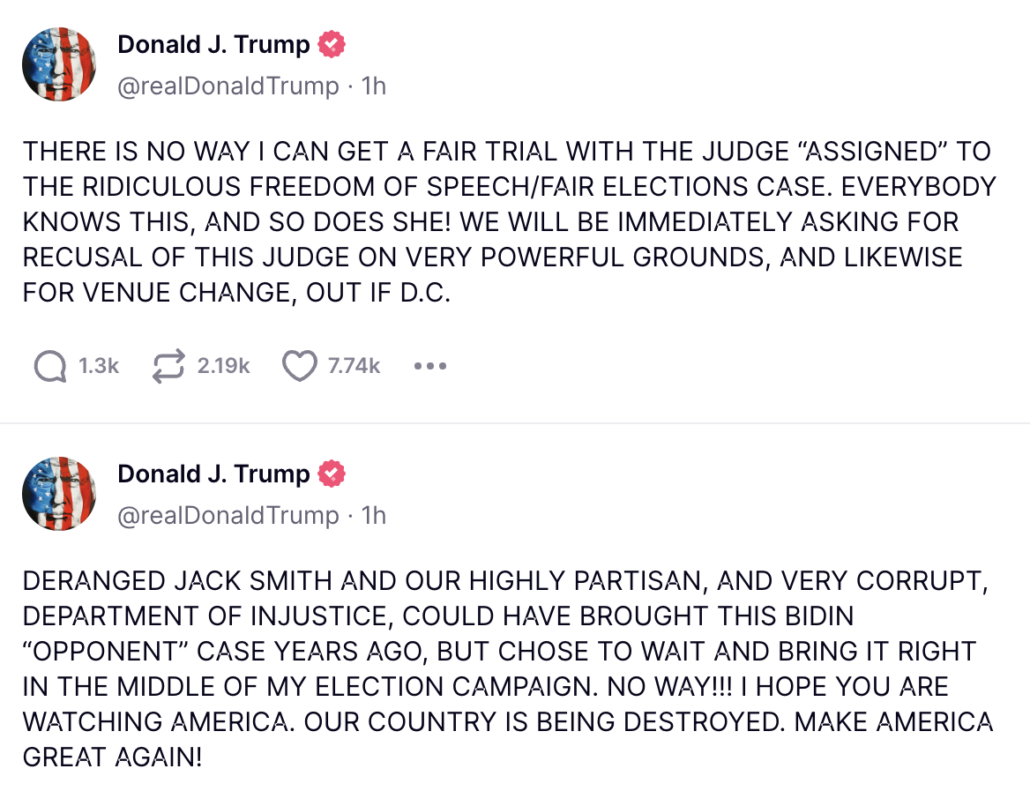I hope that I was duly cautious in my discussions about Abbe Lowell’s request to subpoena Donald Trump, Bill Barr, Jeffrey Rosen, and Richard Donoghue.
I stated that “That political argument” Lowell was making about Trump’s hypocrisy “won’t work.”
I described that several aspects of the proposed subpoenas asked for the impossible.
These are impossible subpoenas, insofar as they ask for compliance according to an impossible timeline and ask for compliance that may not legally be available (indeed, to the extent Trump has items in his possession, for various reason they may be covered by the Mar-a-Lago protective order). To the extent subpoenas ask for things covered by various privileges, they would pose impossible challenges to overcome. To the extent the subpoenas ask for the perfect phone call in which Trump demanded Zelenskyy’s help with an investigation of Hunter Biden, they are impossible subpoenas because the White House altered that record in real time.
I similarly noted that Lowell didn’t mention, at all, the precedent that would make this request impossible.
Lowell doesn’t mention Armstrong, the precedent that usually makes it impossible for defendants to get discovery in selective prosecution challenges.
I gave all those warnings, in part, to make as clear as I could that this request likely won’t work.
But I also gave these warnings for another reason: Abbe Lowell is no dummy. He knows these precedents. He knows the significance of Armstrong. His silence about it ought to have raised questions — it certainly did for me — about what he was trying to accomplish with this motion.
But that may be instructive. Before Lowell is making a request for discovery based on a selective and/or vindictive prosecution claim, he is first asking for subpoenas, without fully laying out whether this would be a selective or vindictive or political influence prosecution claim.
I lay that out because David Weiss’ response — signed by “Principal Senior Assistant Special Counsel” Leo Wise, the third title Wise has adopted over the course of his seven month involvement in this case — goes to great length (twice the length of Lowell’s 16-page motion) to cite those precedents over and over and over. 48 times, Principal Senior Assistant Special Counsel Leo Wise invokes Armstrong.
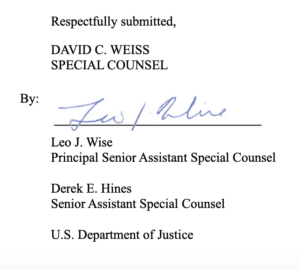
Principal Senior Assistant Special Counsel Leo Wise is absolutely right about all these precedents.
Where he struggles, unsurprisingly, is in characterizing Lowell’s intent. He claims to be so sure that this request is exclusively about a selective or vindictive prosecution claim that he spends 17 pages arguing that Lowell has not met a selective or vindictive prosecution standard in the subpoena request before he gets around to arguing what is before him: a request for subpoenas.
Along the way, Principal Senior Assistant Special Counsel Leo Wise lectures Abbe Lowell, twice, that selective and vindictive prosecution claims are pretrial motions, not trial defenses.
Defendant contends that the requested material “goes to the heart of his pre-trial and trial defense that this is, possibly, a vindictive or selective prosecution that arose out of an incessant pressure campaign that began in the last administration, in violation of Mr. Biden’s constitutional rights.” ECF 58, at 14. It is worth noting from the outset that defendant misunderstands the difference between pretrial arguments to dismiss an indictment and trial defenses. It is black-letter law that claims of vindictive and selective prosecution are not trial defenses and may only be brought and litigated pretrial. They are not defenses and, therefore, are never argued to trial juries.
[snip]
As a preliminary matter, the government notes that defendant’s description of this claim as a “trial defense” is erroneous. “A selective-prosecution claim is not a defense on the merits to the criminal charge itself, but an independent assertion that the prosecutor has brought the charge for reasons forbidden by the Constitution.”
In the process, Principal Senior Assistant Special Counsel Leo Wise makes an important false representation. He claims that selective and vindictive prosecution is the “sole” reason Lowell is asking for subpoenas.
Defendant’s motion gives, as the sole justification for these subpoenas, that they are in support of his “pre-trial and trial defense that this is, possibly, a vindictive or selective prosecution.” ECF 58, at 14. [my emphasis; note, because Wise uses italics a lot, I’ve taken the painful step of using underline to emphasize throughout this post]
Principal Senior Assistant Special Counsel Leo Wise ignores at least three other descriptions of why Lowell wants the subpoenas, all of which precede that language on page 14 that invokes a trial defense.
In this case, production of documents by each of the Subpoena Recipients prior to trial may be used either in pre-trial pleadings or in a pre-trial evidentiary hearing on Mr. Biden’s motions to dismiss the Indictment (or, potentially, another issue).
[snip]
The information Mr. Biden seeks from the Subpoena Recipients is relevant and material to a fundamental aspect of issues in his defense that will be addressed in pre-trial motions and possibly as impeachment of a trial witness, should the case get that far: whether this investigation or prosecution arose because of or in response to any Executive Branch official or other outside influences placing undue pressure on government officials to investigate, formally or informally, or prosecute Mr. Biden.
[snip]
All the information sought from the Subpoena Recipients would be admissible in pre-trial motions or an evidentiary hearing or, depending on the author and recipient, to impeach a trial witness. [my emphasis]
Impeaching a witness is the antecedent to that reference to a trial defense.
Principal Senior Assistant Special Counsel Leo Wise appears to know that.
When Principal Senior Assistant Special Counsel Leo Wise finally gets around to arguing about subpoenas, rather than selective and vindictive prosecution, he seems to admit that he has read those references to impeachment, because he cites the part of Nixon that distinguishes between evidentiary subpoenas (which you can get pretrial) and impeachment ones (which you can only get at trial).
Accordingly, courts have concluded that “[t]he weight of authority holds that in order to be procurable by means of a Rule 17(c) subpoena, materials must themselves be admissible evidence.” United States v. Cherry, 876 F. Supp. 547, 552-53 (S.D.N.Y. 1995) (citing cases). Indeed, in Nixon itself, the Supreme Court noted that even though, “[g]enerally, the need for evidence to impeach witnesses is insufficient to require its production in advance of trial,” the “other valid potential evidentiary uses for the same material” rendered it properly obtainable through Rule 17(c). 418 U.S. at 701. Applying Nixon’s standard, the Third Circuit held that potential impeachment material without an independent basis for admissibility could not be produced to the moving party before the witness testified inconsistently at trial, even if the material had some exculpatory value. See United States v. Cuthbertson (Cuthbertson II), 651 F.2d 189, 192, 195 (3d Cir. 1981) (citing Cuthbertson I, 630 F.2d at 144-46).
Reading Armstrong and Nixon together compels the conclusion that Rule 17(c) may not be used to discover material for pre-trial collateral attacks. Nixon unambiguously imposed limitations on Rule 17(c) subpoenas to “evidentiary” and admissible materials for use at trial, which closes off criminal discovery on collateral, pre-trial issues. See 418 U.S. at 699; see generally Fed. R. Evid. 104, 1101(d) (providing that courts are not bound by the Federal Rules of Evidence other than privilege in various non-trial stages of criminal cases). Then, in Armstrong, although it proceeded on the undecided assumption that some discovery might be available on an adequate showing, the Supreme Court nonetheless unequivocally held that the defendant’s “defense” does not encompass collateral selective-prosecution attacks on the indictment. 517 U.S. at 463 (“[I]n the context of Rule 16 ‘the defendant’s defense’ means the defendant’s response to the Government’s case in chief.”); cf. supra note Error! Bookmark not defined.. Put simply, because Rule 17 is not “a means of discovery in criminal cases” (Nixon, 418 U.S. at 699), defendants may not use it to investigate whether some material that might be useful to some pre-trial motion a defendant may make exists in the files of the government or a third party. Instead, Rule 17(c) is a limited, trial-focused mechanism for procuring known, identifiable evidence. [underlines my own; bolded reference to a note that Principal Senior Assistant Special Counsel Leo Wise thought better of, his]
Only in reading Armstrong and Nixon together — along with citing an SDNY District opinion in Donzinger that is not remotely precedential in this case — does Principal Senior Assistant Special Counsel Leo Wise address the request before him. But in doing so, he confesses that his earlier representation — that the “sole” reason Lowell asked for these subpoenas was for pretrial motions to dismiss — was false. Maybe that’s why he decided to lecture Lowell that selective and vindictive prosecution are not trial defenses: to cover up his later admission he knows there’s something more here, impeachment of some witness Lowell doesn’t identify (but which might be related to Principal Senior Assistant Special Counsel Leo Wise’s recent promotion).
Because Principal Senior Assistant Special Counsel Leo Wise misrepresents what Lowell is trying to do here, much of his 32-page response resembles a quixotic effort (in the literal, literary sense) to beat down an imaginary windmill he has not yet come before. Over and over, Principal Senior Assistant Special Counsel Leo Wise argues that Abbe Lowell, whom he has lectured about how one uses a pretial motion to dismiss, has not met the standard for selective and vindictive prosecution claims he won’t argue until next week.
In seeking discovery for a claim of selective prosecution, defendant fails to identify even one similarly situated individual who was not prosecuted for similar conduct. This omission alone precludes his request for discovery. See, e.g., United States v. Armstrong, 517 U.S. 456 (1996).
[snip]
Defendant’s motion does not even attempt to make a showing of similarly situated individuals who were not prosecuted. It discusses no comparators at all, much less articulates the basis on which a court could find that they are “similarly situated” to the defendant but for a protected characteristic. [my underline, Principal Senior Assistant Special Counsel Leo Wise’s italics]
Of course Lowell did not discuss comparators! He’s likely to do that next week. This is not (as Principal Senior Assistant Special Counsel Leo Wise describes it here) a request for discovery. It’s a request for subpoenas.
I suggested that one reason Lowell may have done this, file a motion for subpoenas before filing the motions to dismiss, is to invite Weiss’ team to lay out their argument. If that was part of the goal, whooboy did Lowell hit paydirt in several specific arguments Principal Senior Assistant Special Counsel Leo Wise made.
For example, Principal Senior Assistant Special Counsel Leo Wise’s argument against vindictive prosecution was comparatively thin. As I laid out here, if Hunter Biden makes such a claim, he would argue that David Weiss entered into a Diversion Agreement that Leo Wise, then a garden variety AUSA, told Judge Maryanne Noreika on July 26, was a “contract between the parties … in effect until it’s either breached or a determination, period,” a contract, period, which then-Assistant Special Counsel Leo Wise breached (Lowell will argue) when he indicted the President’s son in retaliation for Hunter’s not guilty plea to the tax charges. Merits aside, such a claim is pretty obvious to me. But Principal Senior Assistant Special Counsel Leo Wise complains that Hunter Biden never identifies what right — the right to plead not guilty — he is being punished for.
Defendant never squarely identifies what right he is purportedly being punished for asserting. But Goodwin makes clear he is not entitled to a presumption of vindictiveness here, and that, in the absence of one, the prosecutor remains entitled to a presumption of regularity, which can be rebutted only by clear evidence that his motivation was “solely” to punish the exercise of a legal right, rather than the usual prosecutorial interests. Goodwin, 457 U.S. at 380 nn.11–12, 384 n.19. Defendant here offers nothing more than speculation and cannot meet the heightened standard necessary to obtain discovery on such a claim.2
2 The government notes that none of the charges in the indictment carry a mandatory minimum, and the two false-statement charges carry equal or lower statutory penalties to the information’s unlawful-possession charge. See ECF 40; compare 18 U.S.C. § 924(a)(1)(A), (a)(2), with § 924(a)(8).
Again, Lowell’s filing was no more the vindictive prosecution claim than it was the selective prosecution one: Abbe Lowell will presumably describe that right — pleading not guilty — next week.
It’s telling that Principal Senior Assistant Special Counsel Leo Wise never mentions the Diversion Agreement. Nor does he consider whether a Diversion Agreement — that contract, period — situates the decision to indict Hunter anyway in a pretrial or post-resolution posture. I don’t know the answer to that but Principal Senior Assistant Special Counsel Leo Wise better be prepared to address it after Abbe Lowell does file his motion to dismiss next week.
Yet Principal Senior Assistant Special Counsel Leo Wise does that while he makes a premature argument that he didn’t punish Hunter Biden by adding two felony charges that turn his previous 10 year maximum exposure into 25 years. He’s only pretending he doesn’t know what’s coming, it seems.
With regards to the selective prosecution claim, in addition to the standard boilerplate arguments, Principal Senior Assistant Special Counsel Leo Wise anticipates that Hunter Biden might argue he’s in a class of one — that his theory of selective prosecution will be different than claims based on racial discrimination. In obligingly providing Lowell his thinking on the matter, Principal Senior Assistant Special Counsel Leo Wise revealed that the citations he will invoke if and when Lowell does make this argument next week really aren’t all that apt to this case.
Defendant has the burden to plead a theory of selective prosecution that would allow discovery, and he has not done so. The government briefly notes that other theories of selective prosecution fit his case even less. For example, in some cases, a defendant may not need to show these elements if the Executive Branch’s action was “based on an overtly discriminatory classification”; in those circumstances, the overtly discriminatory classification itself satisfies the showing of discriminatory intent. Wayte, 470 U.S. at 608 n.10 (citing Strauder v. West Virginia, 100 U.S. 303 (1880), which invalidated a state law that prohibited African-Americans from serving on juries). But defendant’s motion contains no argument or evidence in support of such a claim. Instead, the arguments he advances appear to fall within the ordinary formulation of selective prosecution, which requires proof of both disparate treatment and discriminatory intent.
Alternatively, a defendant could theoretically seek to advance a selective-prosecution claim based on post-Armstrong/Wayte cases addressing what has been termed a “class-of-one equal-protection claim.” See, e.g., Village of Willowbrook v. Olech, 528 U.S. 562 (2000) (per curiam). But after the Supreme Court decided Olech, the Court rejected the class-of-one theory in a context where the government exercises broad discretion—namely, when the government acts as an employer and makes personnel decisions. See Engquist v. Oregon Dept. of Agriculture, 553 U.S. 591 (2008). The Court observed that “some forms of state action … by their nature involve discretionary decisionmaking based on a vast array of subjective, individualized assessments,” and “in such cases the rule that people should be ‘treated alike, under like circumstances and conditions’ is not violated when one person is treated differently from others, because treating like individuals differently is an accepted consequence of the discretion granted.” Id. at 603. Notably, to illustrate this point, the Supreme Court used an example where only some drivers who are exceeding the speed limit are stopped. “[A]n allegation that speeding tickets are given out on the basis of race or sex would state an equal protection claim. But allowing an equal protection claim on the ground that a ticket was given to one person and not others, even if for no discernible or articulable reason, would be incompatible with the discretion inherent in the challenged action.” Id. at 604.
Courts of appeals have extended Engquist’s limitation on class-of-one theories in various contexts where the government exercises broad discretion. See, e.g., Planned Parenthood Ass’n of Utah v. Hebert, 828 F.3d 1245, 1255 (10th Cir. 2016) (collecting cases). And as Engquist’s example of stopping speeders illustrates, the Supreme Court has repeatedly emphasized that “in the criminal-law field, a selective prosecution claim is a rara avis” and is so “[b]ecause such claims invade a special province of the Executive—its prosecutorial discretion.” Reno v. Am.- Arab Anti-Discrimination Comm., 525 U.S. 471, 489 (1999) (citing Armstrong, 517 U.S. at 463– 65). Cf. United States v. Moore, 543 F.3d 891, 901 (7th Cir. 2008) (“[A] class-of-one equal protection challenge, at least where premised solely on arbitrariness/irrationality, is just as much a ‘poor fit’ in the prosecutorial discretion context as in the public employment context” considered in Engquist). In addition to Rivera, in the context of parole decisions for sex offenders, the Third Circuit has recognized the force of Engquist’s limitations on equal protection challenges where the “state action … involves ‘discretionary decisionmaking based on a vast array of subjective, individualized assessments’ [that] necessarily results in different treatment among those subject to the discretionary action.” Stradford v. Sec. Penn. Dept. of Corrections, 53 F.4th 67, 76 (3d Cir. 2022) (quoting Engquist, 553 U.S. at 603–04). Engquist, Rivera, and Stradford provide no home for a class-of-one theory in the context of this case.
A class-of-one selective prosecution claim made by the son of the President is in no way going to be based on a theory of arbitrariness.
In fact Principal Senior Assistant Special Counsel Leo Wise recognizes that, elsewhere. When he tries to argue that the subpoena recipients had no role in the charges in this case, he mentions that private citizen Hunter Biden happens to be the son of the President.
In any event, both vindictive- and selective-prosecution claims turn on the actual intent of the specific decisionmaker in a defendant’s case: here, the Special Counsel. But not only does defendant’s motion fail to identify any actual evidence of bias, vindictiveness, or discriminatory intent on the Special Counsel’s part, his arguments ignore an inconvenient truth: No charges were brought against defendant during the prior administration when the subpoena recipients actually held office in the Executive Branch. Instead, every charge in this matter was or will be brought during the current administration—one in which defendant’s father, Joseph R. Biden, is the President of the United States and Merrick B. Garland is the Attorney General that was appointed by President Biden and who personally appointed the Special Counsel. Defendant has not shown, nor can he, how external statements by political opponents of President Biden improperly pressured him, his Attorney General, or the Special Counsel to pursue charges against the President’s son.
[snip]
Defendant focuses his narrative of selective prosecution largely on the actions and motivations of non-prosecuting officials in the previous administration prior to any charges being brought. However, after a change in administrations—to one headed by defendant’s father, who leads a competing political party—the President’s current Attorney General personally exercised his discretion to direct “a full and thorough investigation” of these matters and conferred on the Special Counsel statutory and regulatory authority to prosecute this case. See Order No. 5730-2023 (Aug. 11, 2023) (citing 28 U.S.C. §§ 509, 510, 515, 533 and 28 C.F.R. pt. 600). 1 Thus, defendant’s claim of selective prosecution must contend with the presumption of regularity not only for the Special Counsel’s decision to prosecute but also for both the Attorney General’s decision to direct a full and thorough investigation and the Attorney General’s determination that the prosecution warrants the greater authority and independence of the Special Counsel’s Office. On those points, in addition to offering no evidence that the now-Special Counsel had any animus or improper motivation against defendant, he offers no evidence that the current Attorney General acted out of any improper motive in empowering the Special Counsel to continue pursuing prosecution. [my emphasis]
The defendant is the son of the President?!?!?! Wow. You don’t say?!?!?!
I’m not certain, but I don’t think this has been stated explicitly in this case before. Hunter’s motion to do his arraignment by video described him as a Secret Service protectee, for example, but didn’t explicitly say why.
We have now taken judicial notice that Hunter Biden has some kind of familial tie to the Chief Executive.
And this is where Principal Senior Assistant Special Counsel Leo Wise’s efforts to disclaim any influence Donald Trump, Bill Barr, Jeffrey Rosen, and Richard Donoghue had on this case gets interesting.
Never mind that Principal Senior Assistant Special Counsel Leo Wise sort of ignores the issue that one of the intended subpoena recipients, Donald Trump, appointed Weiss; if Principal Senior Assistant Special Counsel Leo Wise wants to treat justice as a matter of competing parties, as he does here, then Weiss is a member of the other party.
The other things that Principal Senior Assistant Special Counsel Leo Wise does in these passages is to assert the presumption of regularity to Merrick Garland’s decision to honor a promise he made — to a Republican Senator — in his confirmation hearing, to appoint Weiss Special Counsel if Weiss ever asked to be so appointed.
That is, Principal Senior Assistant Special Counsel Leo Wise relies on Garland’s role — as an appointee of the defendant’s father, one who couldn’t fire Weiss without risking accusations of criminal obstruction and impeachment — to vouch for David Weiss’ presumption of regularity. But he does so in a filing where he argues that senior DOJ officials who, Lowell has already shown, were personally involved in the prosecution, along with the President who appointed David Weiss, had a non-prosecutorial role.
Principal Senior Assistant Special Counsel Leo Wise is trying to have it both ways: arguing that Merrick Garland is a part of this prosecution but Donald Trump, Bill Barr, Jeffrey Rosen, and Richard Donoghue are not.
Weiss has told Congress at least four different times that Merrick Garland exercised no supervisory role in this case.
Indeed, he has barely spoken to the man. Weiss told House Judiciary Committee, “I’ve never had any direct communications with the Attorney General, save my communication in requesting Special Counsel authority in August of 2023.” Nor has he had contact with the Deputy Attorney General, nominally his direct supervisor. “I have never spoken with [Lisa] Monaco. … Never.”
Rather than being overseen directly by any political appointee, Weiss’ “point of contact for the last year, year and a half ,” the Special Counsel explained, “has been Associate Deputy Attorney General Weinsheimer.” Brad Weinsheimer was first promoted to that position by Jeff Sessions in 2018.
Weiss’ appointment gets perilously close to violating Morrison v. Olson, because neither Biden nor Garland could fire Weiss, could ever have fired Weiss, without being accused of criminal obstruction. Yet now Principal Senior Assistant Special Counsel Leo Wise is claiming that Merrick Garland’s decision, made in response to a request Weiss made after Congress floated accusations of obstruction anyway, to give him even more independence is proof that Weiss wasn’t responding to political pressure.
Principal Senior Assistant Special Counsel Leo Wise is now suggesting that all Weiss’ claims that Garland had no role were false. He is basing much of his claim that Weiss was not influenced by politics on a reporting structure that has never existed under the Biden Administration, as Weiss has said over and over.
Contrast that with Principal Senior Assistant Special Counsel Leo Wise’s wildly misleading attempt to argue that Bill Barr’s DOJ had no improper influence on this case, the only treatment Principal Senior Assistant Special Counsel Leo Wise gives the specifically identified documents in Lowell’s motion.
Defendant’s attempts to manufacture discriminatory treatment or intent on behalf of the U.S. Attorney fall apart under the most minimal scrutiny. First, defendant obliquely references that “IRS files reveal that [Richard Donoghue] further coordinated with the Pittsburgh Office and with the prosecution team in Delaware, including issuing certain guidance steps regarding overt steps in the investigation.” ECF 58, at 2-3 & n.3. Looking behind the defendant’s ambiguously phrased allegation reveals the actual “overt steps” involved: (1) the U.S. Attorney making an independent assessment of the probable cause underlying a warrant and (2) a direction by Mr. Donoghue that the Delaware investigation receive the information from the Pittsburgh team, which was being closed out. See ECF 58, at 3 n.3 (citing memorandum of conference call). Assessing the validity of a warrant and merely receiving information from other investigating entities does nothing to show any disparate treatment or animus. Next, defendant alleges that “certain investigative decisions were made as a result of guidance provided by, among others, the Deputy Attorney General’s office.” ECF 58, at 3 n.4. In fact, the source cited revealed that the guidance was simply not to conduct any “proactive interviews” yet. Likewise, defendant’s last attempt to create a link involved guidance not to make any “external requests (outside of government),” which followed the long-standing Department of Justice policy to avoid overt investigative steps that might interfere with ongoing elections. See ECF 58, at 3 n.5; cf., e.g., Federal Prosecution of Election Offenses 40 (2d ed. 1980). In other words, the most defendant claims is that the Deputy Attorney General’s office was aware of and involved in some specific investigatory decisions in the most banal fashion possible—by waiting to take specific investigative steps at certain times out of caution.
I have no fucking clue what warrant Principal Senior Assistant Special Counsel Leo Wise is mentioning here; the word “warrant” doesn’t appear in Lowell’s filing (it may be a reference to other documents at the main Ways and Mean link for IRS documents). But what Principal Senior Assistant Special Counsel Leo Wise is doing is suggesting that the Pittsburgh effort to share dirt from Russian spies with David Weiss’ investigative team is the same action as Richard Donoghue’s order before the election not to take overt investigative steps. There’s not a shred of evidence they’re related.
As noted, that’s the only specific rebuttal Principal Senior Assistant Special Counsel Leo Wise attempts to Abbe Lowell’s description of several different kinds of influence on this case. Principal Senior Assistant Special Counsel Leo Wise only makes a general allusion to Donald Trump’s public comments: “how external statements by political opponents of President Biden improperly pressured him.” He certainly doesn’t deny that those threats contributed to the threats made against Weiss and the rest of the investigative team, threats that Weiss described to Congress.
And aside from describing that Lowell wants to subpoena Bill Barr, Principal Senior Assistant Special Counsel Leo Wise never mentions him. Indeed, I think Principal Senior Assistant Special Counsel Leo Wise trips up in not mentioning him.
Principal Senior Assistant Special Counsel Leo Wise claims that Lowell has referenced, “a direction by Mr. Donoghue that the Delaware investigation receive the information from the Pittsburgh team, which was being closed out.” The problem is, unless I’m missing something, there is nothing in the record that describes the investigation was being closed out. Here’s what Lowell referenced:
[I]t has been reported and revealed in the now-public IRS investigative files concerning this case (released by the House Ways and Means Committee1 ) that, separately, the Department of Justice (“DOJ”) under then Attorney General Barr opened a dedicated channel at the U.S. Attorney’s Office in Pittsburgh to receive information about Mr. Biden coming from then President Trump’s personal attorney, Rudolph Giuliani, and his associates. 2 That effort to review and vet any material was coordinated by then U.S. Attorneys Richard Donoghue (E.D.N.Y.) and Scott Brady in Pittsburgh (W.D.P.A.). When Mr. Donoghue was elevated to serve as Principal Associate Deputy Attorney General at the DOJ in July 2020 (and later, in December 2020, Deputy Attorney General under Mr. Rosen), IRS files reveal that he further coordinated with the Pittsburgh Office and with the prosecution team in Delaware, including issuing certain guidance regarding overt steps in the investigation. 3
2 See, e.g., Letter From Asst. Att’y Gen. Stephen E. Boyd to Hon. Jerrold Nadler (Feb. 18, 2020) (available via https://www.justice.gov/) (“[T]he Deputy Attorney General has also assigned Scott Brady, the U.S. Attorney for the Western District of Pennsylvania, to assist in the receipt, processing, and preliminary analysis of new information provided by the public that may be relevant to matters relating to Ukraine.”); Material From Giuliani Spurred a Separate Justice Dept. Pursuit of Hunter Biden, N.Y. TIMES (Dec. 11, 2020), https://www.nytimes.com/2020/12/11/us/politics/hunter-biden-justice-department-pittsburgh.html.
3 Gary Shapley Aff. 3, attach. 6 (IRS CI Memorandum of Conversation, Oct. 22, 2020), (“Pittsburgh read out on their investigation was ordered to be received by this prosecution team by the PDAG.”), available at https://gopwaysandmeans.house.gov/wp-content/uploads/2023/09/T87-Shapley-3_Attachment-6_WMRedacted.pdf.
Gary Shapley’s memo — the only description of how and why this was shared with the Hunter Biden team — only says that Donoghue ordered Weiss’ team to be briefed on it.

One of the most authoritative descriptions of how it got passed on came from … intended subpoena recipient Bill Barr, in an interview with Margot Cleveland.
It’s not true. It wasn’t closed down,” William Barr told The Federalist on Tuesday in response to Democrat Rep. Jamie Raskin’s claim that the former attorney general and his “handpicked prosecutor” had ended an investigation into a confidential human source’s allegation that Joe Biden had agreed to a $5 million bribe. “On the contrary,” Barr stressed, “it was sent to Delaware for further investigation.”
While Lowell hasn’t (yet) included this in his filings, Barr’s communications with Cleveland would be among the key things Lowell might obtain with a subpoena. They are critically important, too, because they prove that the Attorney General himself was involved in this process — that the interference in the Hunter Biden investigation went beyond the DAG’s normal interest in supervising US Attorneys.
And as I’ve mentioned before, Barr’s public intervention came at a critical time. He butted in while Lesley Wolf was still involved with this prosecution, before Weiss reneged on the plea deal negotiated by Wolf, and before David Weiss told Lindsey Graham that the FD-1023 obtained via the process to launder information from Russia spies into the investigation of Donald Trump’s opponent’s son was part of a still-ongoing investigation.
Your questions about allegations contained in an FBI FD-1023 Form relate to an ongoing investigation. As such, I cannot comment on them at this time.
In a filing that entirely ignores Lowell’s citation from Barr’s book, Principal Senior Assistant Special Counsel Leo Wise ignores the public evidence that Bill Barr not only remains involved in this case, but that David Weiss responded to pressure elicited by Barr’s public intervention, and did so by stating that that was part of the ongoing investigation into Joe Biden’s kid.
Principal Senior Assistant Special Counsel Leo Wise’s silence about Barr makes me wonder if the subpoena to him poses a particular risk for Weiss, as if before Weiss made that comment to Lindsey, he got a phone call that would be covered by the subpoena. In any case, whereas Weiss went years before his first contact with Merrick Garland about this case, he did tell HJC that, “I had conversations with Attorney General Barr, and I don’t want to get into the content of those conversations, because they’re with the AG.”
In any case, I’m genuinely shocked by the flopsweat that this subpoena request from Lowell produced. Indeed, that is one reason I’m so interested in Principal Senior Assistant Special Counsel Leo Wise’s fancy new title.
Though Lowell never said it, I suspect the likely witness Hunter Biden’s lawyer wants to impeach at trial is David Weiss himself.
Weiss is the single solitary witness who can attest to how and why the prosecution transitioned from Lesley Wolf to Principal Senior Assistant Special Counsel Leo Wise. He is the single solitary witness who can claim that that wasn’t a result of either political pressure directly or the pressure created by credible threats of violence targeted at him, his investigative team, and their families.
But Weiss has also now committed to the continued influence of Scott Brady’s task on the ongoing investigation into Hunter Biden. Brady told the House Judiciary Committee that he and Weiss spoke, personally, every four to six weeks between around January 10 and the final briefing in October. He described making “other recommendations about possible investigative avenues that we would recommend that they take.”
And by blabbing to Margot Cleveland, Bill Barr has made public that he was also in the thick of all that.
Weiss is in a position where he has no one to blame. He really can’t — and never could — borrow presumption of regularity from Merrick Garland, because his continued tenure always came on the threat of obstruction charges (and impeachment). He can’t — and never could — invoke Garland’s DOJ to claim his prosecution is not political, because Garland has made a point to be hands off, as Weiss has affirmed to Congress.
But he also is totally in the thick of the wildly inappropriate scheme that Bill Barr set up, one that catered to laundering claims Donald Trump’s personal lawyer had obtained from, among others, a Russian spy.
And that, I suspect, is why Principal Senior Assistant Special Counsel Leo Wise got another promotion: because Weiss himself now poses a threat to this prosecution.
Update: Added specifics about Weiss’ testimony as to contacts with Garland, Lisa Monaco, Brad Weinsheimer, and Bill Barr.



